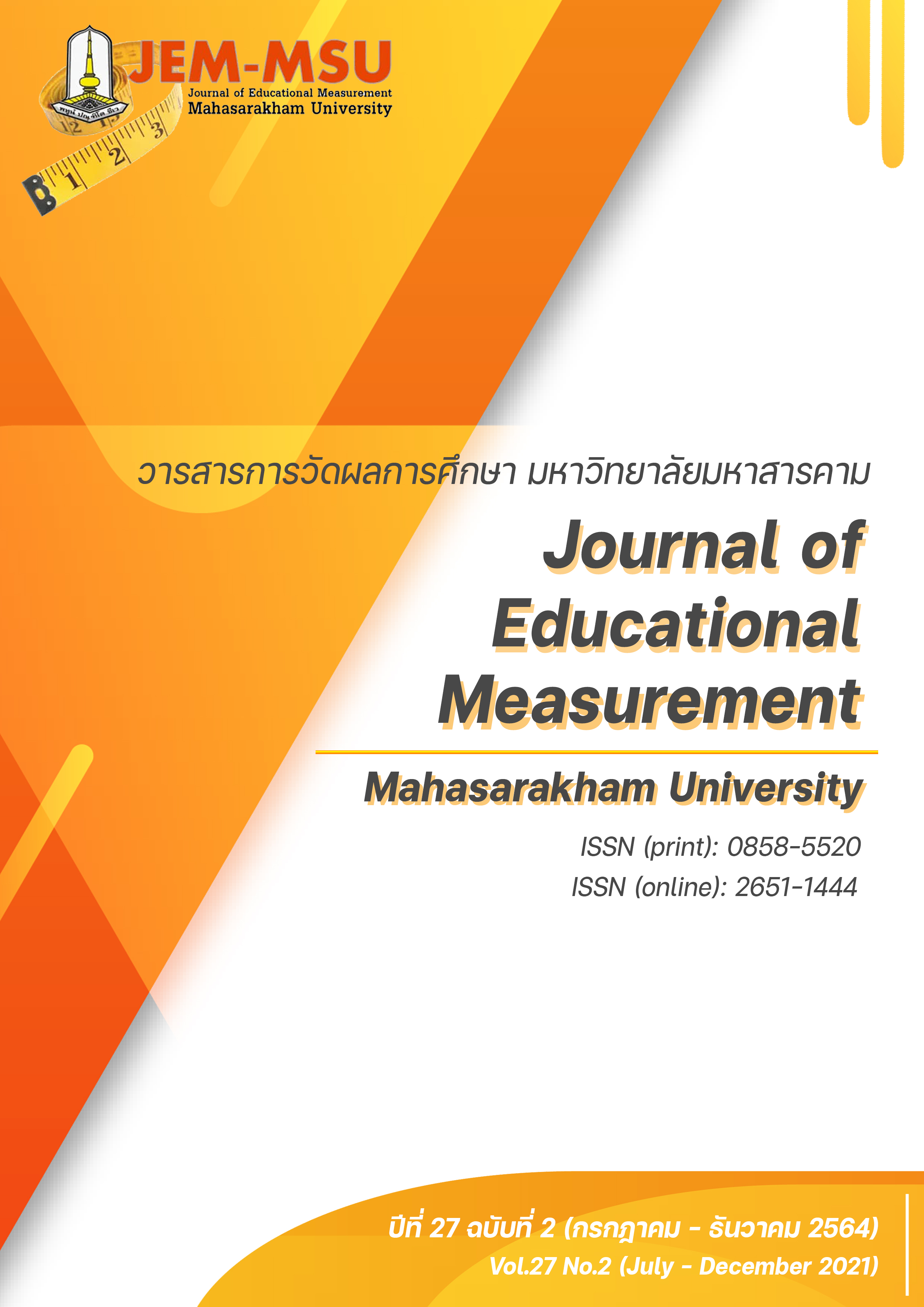ผลของการเรียนด้วยระบบการเรียนแบบปรับเหมาะตามรูปแบบการเรียนรู้ VARK เพื่อเสริมสร้างผลสัมฤทธิ์ทางการเรียนของนักศึกษาระดับปริญญาตรี สาขาเทคโนโลยีสารสนเทศ มหาวิทยาลัยเทคโนโลยีพระจอมเกล้าพระนครเหนือ วิทยาเขตปราจีนบุรี
Main Article Content
บทคัดย่อ
งานวิจัยนี้มีวัตถุประสงค์เพื่อพัฒนาระบบการเรียนรู้แบบปรับเหมาะตามรูปแบบการเรียนรู้ VARK โดยระบบที่จะทำการวิเคราะห์และนำเสนอเนื้อหาที่ตรงกับความถนัดของผู้เรียน และเพื่อศึกษาผลสัมฤทธิ์ ความก้าวหน้าและความสำเร็จทางการเรียนของกลุ่มตัวอย่างได้แก่นักศึกษาระดับปริญญาตรี สาขาวิชาเทคโนโลยีสารสนเทศ มหาวิทยาลัยเทคโนโลยีพระจอมเกล้าพระนครเหนือ วิทยาเขตปราจีนบุรี ซึ่งมีพฤติกรรมในการเรียนที่แตกต่างกันด้วยระบบที่พัฒนาขึ้น
ผลการวิเคราะห์จากกลุ่มผู้เรียนที่ศึกษาบทเรียนเรื่องการสร้างสื่อดิจิทัล ทั้งหมด 7 บท 25 หัวข้อย่อย จำนวน 52 คนพบว่า กลุ่มผู้เรียนที่เลือกรูปแบบของสื่อการเรียนตามที่ระบบแนะนำ (follow) จำนวน 32 คน คิดเป็นร้อยละ 61.54 มีผลสัมฤทธิ์ทางการเรียนเฉลี่ยร้อยละ 76.12 ความก้าวหน้าทางการเรียนเฉลี่ยร้อยละ 44.38 ความสำเร็จทางการเรียนเฉลี่ยร้อยละ 73.72 กลุ่มผู้เรียนที่กึ่งเลือกรูปแบบของสื่อการเรียนตามที่ระบบแนะนำ (semi follow) จำนวน 15 คน คิดเป็นร้อยละ 28.85 มีผลสัมฤทธิ์ทางการเรียนเฉลี่ยร้อยละ 67.62 ความก้าวหน้าทางการเรียนร้อยละ 34.00 และกลุ่มที่ไม่เลือกรูปแบบการเรียนตามที่ระบบแนะนำ (not follow) จำนวน 5 คน คิดเป็นร้อยละ 9.61 มีผลสัมฤทธิ์ทางการเรียนเฉลี่ยร้อยละ 60.57 มีค่าเฉลี่ยความก้าวหน้าทางการเรียนร้อยละ 13.71
สรุปได้ว่าระบบการเรียนรู้แบบปรับเหมาะตามรูปแบบการเรียนรู้ VARK เพื่อเสริมสร้างผลสัมฤทธิ์ทางการเรียน พบว่ากลุ่มผู้เรียนที่เลือกรูปแบบของสื่อการเรียนตามที่ระบบแนะนำ มีผลสัมฤทธิ์ ความก้าวหน้าและความสำเร็จทางการเรียนดีกว่ากลุ่มผู้เรียนที่ไม่ได้เลือกรูปแบบของสื่อการเรียนตามที่ระบบแนะนำ
Article Details
เนื้อหาและข้อมูลในบทความที่ลงตีพิมพ์ในวารสารการวัดผลการศึกษา มหาวิทยาลัยมหาสารคาม ถือเป็นข้อคิดเห็นและความรับผิดชอบของผู้เขียนบทความโดยตรง ซึ่งกองบรรณาธิการวารสาร ไม่จำเป็นต้องเห็นด้วย หรือร่วมรับผิดชอบใดๆ
บทความ ข้อมูล เนื้อหา รูปภาพ ฯลฯ ที่ได้รับการตีพิมพ์ในวารสารการวัดผลการศึกษา มหาวิทยาลัยมหาสารคาม ถือเป็นลิขสิทธิ์ของวารสารการวัดผลการศึกษา มหาวิทยาลัยมหาสารคาม หากบุคคลหรือหน่วยงานใดต้องการนำทั้งหมดหรือส่วนใดส่วนหนึ่งไปเผยแพร่ต่อหรือกระทำการใดๆ จะต้องได้รับอนุญาตเป็นลายลักษณ์อักษรจากวารสารการวัดผลการศึกษา มหาวิทยาลัยมหาสารคาม ก่อนเท่านั้น
เอกสารอ้างอิง
มณีนุช นิธิพงษ์วนิช. (2556). การศึกษาเรื่อง ปัจจัยที่มีผลต่อความสำเร็จทางการเรียนของพนักงานธนาคารกสิกรไทย ที่ได้รับการเรียนรู้ผ่านสื่ออิเล็กทรอนิกส์ (e-Learning). วิทยาศาสตรมหาบัณฑิต สาขาวิชาวิชาการจัดการทรัพยากรมนุษย์ คณะวิทยาลัยบัณฑิตศึกษาด้านการจัดการ มหาวิทยาลัยศรีปทุม.
วีณา คงพิษ. (2560). การพัฒนารูปแบบการเรียนการสอนโดยใช้โครงงานเป็นฐานผ่านเครือข่ายคอมพิวเตอร์ ที่มีการช่วยเสริมศักยภาพทางการเรียนตามการเรียนรู้แบบ VARK. วิทยานิพนธ์ปรัชญาดุษฎีบัณฑิต สาขาวิชาคอมพิวเตอร์ศึกษา ภาควิชาคอมพิวเตอร์ศึกษา บัณฑิตวิทยาลัย มหาวิทยาลัยเทคโนโลยีพระจอมเกล้าพระนครเหนือ.
สุไม บิลไบ. (2557). เอกสารประกอบการสอน นวัตกรรมและเทคโนโลยีสารสนเทศทางการศึกษา. [ออนไลน์]. ได้จาก: https://drsumaibinbai.files.wordpress.com [สืบค้นเมื่อ 7 มิถุนายน 2563].
เสาวภา วิชาดี. (2554). รูปแบบการเรียนรู้ของผู้เรียนในมุมมองของทฤษฎีการเรียนรู้แบบประสบการณ์.วารสารนักบริหาร, 31(1), 175-180.
อรนุช พันโท และมนต์ชัย เทียนทอง. (2559). การสังเคราะห์โมเดลการเรียนรู้ด้วยอีเลิร์นนิ่งแบบปรับเหมาะ ที่มีระบบพี่เลี้ยงอิเล็กทรอนิกส์โดยใช้รูปแบบการเรียนรู้ VARK ที่วิเคราะห์ด้วยวิธีเหมืองข้อมูล. ปรัชญาดุษฎีบัณฑิต สาขาวิชาเทคโนโลยีสารสนเทศ ภาควิชาเทคโนโลยีสารสนเทศ บัณฑิตวิทยาลัยมหาวิทยาลัยเทคโนโลยีพระจอมเกล้า พระนครเหนือ.
Alghamdi, M., Lamb, D.J., Al-Jumeily, D. & Hussain, A.J. (2013). Assessing the Impact of Web-Based Technology on Learning Styles in Education. pp. 348-353. In 2013 Sixth International Conference on Developments in eSystems Engineering, 16-18 December 2013, Abu Dhabi, United Arab Emirates.
Daoruang, B., Chaichomchuen, S. & Mingkhwan, A. (2018). An Adaptive Learning System Based on Proportional VARK to Enhance Learning Achievement Concept. pp. 17-18. In The 4th Joint Symposium on Computational Intelligence (JSCI4), 2 February 2018, King Mongkut’s University of Technology Thonburi, Bangkok.
Daoruang, B., Sintanakul, K. & Mingkhwan, A. (2019). The Study of Learning Achievement of Learners Classified VARK Learning Style in Blended Learning. pp. 34-38. In the 2019 3rd International Conference on Natural Language Processing and Information Retrieval, June 2019, Tokushima, Japan.
Fleming et al., (2008). VARK a guide to learning styles [Online]. Available from: http://www.varklearn.com. [accessed 1 October 2020].


